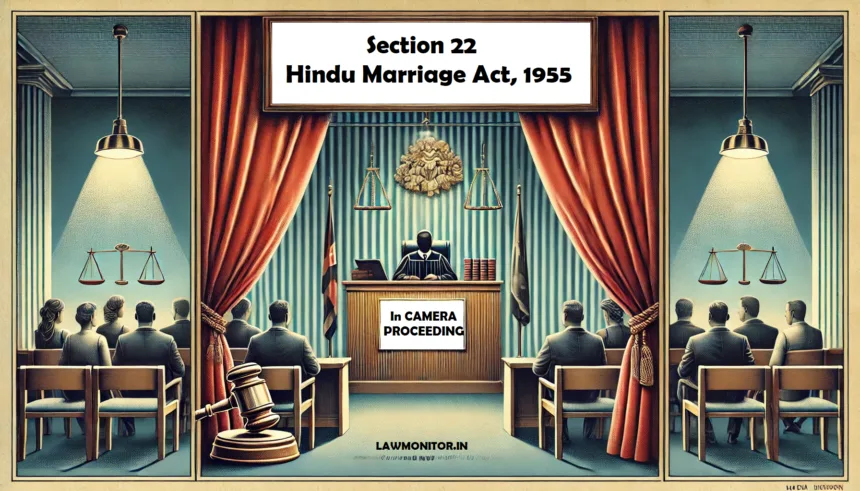What to do if someone publishes or shares my divorce case? Many of you have this question. For this Section 22 of Hindu Marriage Act comes into force. In this article we read what is section 22 and whats its objective.
Section 22 of the Hindu Marriage Act, 1955, is as follows:
22. Proceedings to be in camera and may not be printed or published
(1) Every proceeding under this Act shall be conducted in camera, and it shall not be lawful for any person to print or publish any matter in relation to any such proceeding except a judgment of the High Court or of the Supreme Court with the prior permission of the Court.
(2) If any person prints or publishes any matter in contravention of the provisions contained in sub-section (1), he shall be punishable with fine which may extend to one thousand rupees.
Explanation of Section 22
(i) Conduct of Proceedings in Camera
- The phrase “in camera” means that the court proceedings will be conducted privately, without public access.
- This ensures that sensitive details of matrimonial disputes, such as those related to divorce, judicial separation, annulment, or restitution of conjugal rights, are not disclosed publicly.
- It provides privacy to the parties involved and prevents unnecessary social stigma.
(ii) Restriction on Publication of Court Proceedings
- No one is allowed to print or publish details of any proceedings under the Hindu Marriage Act unless permitted by the High Court or Supreme Court.
- This restriction applies to newspapers, social media, magazines, and any other form of publication.
(iii) Exception for Judgments of Higher Courts
- Judgments of the High Court or Supreme Court can be published, but only with prior permission from the court.
- This allows the dissemination of important legal principles while maintaining the confidentiality of personal details.
(iv) Punishment for Violation
- If a person violates this provision by publishing restricted content, they may be fined up to ₹1,000.
- This penalty serves as a deterrent against the unauthorized disclosure of sensitive legal matters.
Objective and Significance of Section 22
Protects Privacy – Ensures that personal and sensitive matters remain confidential.
Prevents Social Stigma – Matrimonial disputes can be emotionally and socially challenging, and this provision prevents unnecessary embarrassment.
Maintains Dignity of Individuals – Parties involved in family disputes are safeguarded from public scrutiny.
Encourages Fair Proceedings – Helps the parties speak openly in court without fear of public judgment.
Comparison with Other Laws
Code of Civil Procedure, 1908 – While civil proceedings are usually public, Section 22 of the Hindu Marriage Act makes an exception for matrimonial cases.
Indian Penal Code, 1860 – Defamation laws (Section 499 & 500 IPC) also provide remedies for those whose reputation is damaged by unauthorized publication.
Special Marriage Act, 1954 – Similar provisions exist under this law for the privacy of court proceedings.



